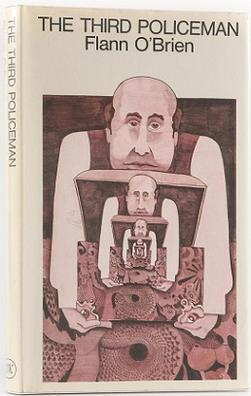The Third Policeman

First edition
|
|
| Author | Flann O'Brien |
|---|---|
| Country | Ireland |
| Language | English |
| Genre | Comedy, Philosophical novel |
| Publisher | Dalkey Archive Press |
|
Publication date
|
1967 |
| Media type | Print (hardback & paperback) |
| Pages | 212 pp |
| OCLC | 40489146 |
| 823/.912 21 | |
| LC Class | PR6029.N56 T48 1999 |
The Third Policeman is a novel by Irish writer Brian O'Nolan, writing under the pseudonym Flann O'Brien. It was written between 1939 and 1940, but after it initially failed to find a publisher, the author withdrew the manuscript from circulation and claimed he had lost it. The book remained unpublished until his death in 1966. It was printed by MacGibbon & Kee in 1967.
The Third Policeman is set in rural Ireland and is narrated by a dedicated amateur scholar of de Selby, a scientist and philosopher. The narrator, whose name we never learn, is orphaned at a young age. At boarding school, he discovers the work of de Selby and becomes a fanatically dedicated student of it. One night he breaks his leg under mysterious circumstances – "if you like, it was broken for me" – and he is ultimately fitted with a wooden leg to replace the original one. On returning to his family home, he meets and befriends John Divney who is in charge of the family farm and pub. Over the next few years, the narrator devotes himself to the study of de Selby's work and leaves Divney to run the family business.
By the time the narrator is thirty, he has written what he believes to be the definitive critical work on de Selby, but does not have enough money to have it published. Divney observes that Mathers, a local man, "is worth a packet of potato-meal" and eventually it dawns on the narrator that Divney plans to rob and kill Mathers. The narrator and Divney encounter Mathers one night on the road and Divney knocks Mathers down with a bicycle pump. The narrator, prompted by Divney, finishes Mathers off with a spade, and then notices that Divney has disappeared with Mathers's cash box. When Divney returns, he refuses to reveal the location of the cash box and fends off the narrator's repeated inquiries. To ensure that Divney does not retrieve the box unobserved, the narrator becomes more and more inseparable from Divney, eventually sharing a bed with him: "the situation was a queer one and neither of us liked it".
Three years pass, in which the previously amicable relationship between the narrator and Divney breaks down. Eventually Divney reveals that the box is hidden under the floorboards in Mathers's old house, and instructs the narrator to fetch it. The narrator follows Divney's instructions but just as he reaches for the box, "something happened":
It was as if the daylight had changed with unnatural suddenness, as if the temperature of the evening had altered greatly in an instant or as if the air had become twice as rare or twice as dense as it had been in the winking of an eye; perhaps all of these and other things happened together for all my senses were bewildered all at once and could give me no explanation.
The box has disappeared, and the narrator is perplexed to notice that Mathers is in the room with him. During a surreal conversation with the apparently dead Mathers, the narrator hears another voice speaking to him which he realises is his soul: "For convenience I called him Joe." The narrator is bent on finding the cash box, and when Mathers tells him about a remarkable police barracks nearby he resolves to go to the barracks and enlist the help of the police in finding the box. On the way, he meets a one-legged bandit named Martin Finnucane, who threatens to kill him but who becomes his friend upon finding out that his potential victim is also one-legged. The narrator approaches the police barracks and is disturbed by its appearance:
...
Wikipedia
